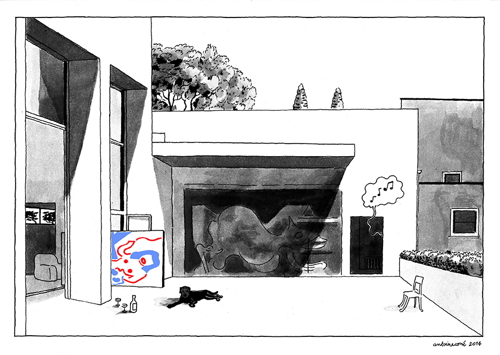
It’s hard to convince me to not contribute to the growing number of small press comic subscriptions–every season there seems to be even more great material I want to get my hands onto, and it’s a rather addicting cycle of excitement whenever there’s a new package at my door. Oily has proven to be an exceptionally versatile publisher with their subscriptions—the form of their pocket-size, digestible mini-comics has parlayed a habit-forming nature in their readership that stays true to the internal logic of comics. Series like Melissa Mendes’s Lou and Charles Forsman’s TEOTFW have hooked many a fan in, including myself, allowing a sense of gratification and appreciation that hasn’t always been as accessible in indie comics. There is something quite rewarding about receiving an Oily bundle; the mini-comics are neighborly crafted and packaged to make you feel welcome from the outset.
This season’s Spring Oily Bundle, a limited 200 count batch, featured 9 different mini-comics along with additional prints and art from the stylish roster of Oily cartoonists. Mixing a touch of the familiar and the new, this was an impressionably refreshing stack of work, demonstrating the inarguable benefits of reading comics in their printed format.
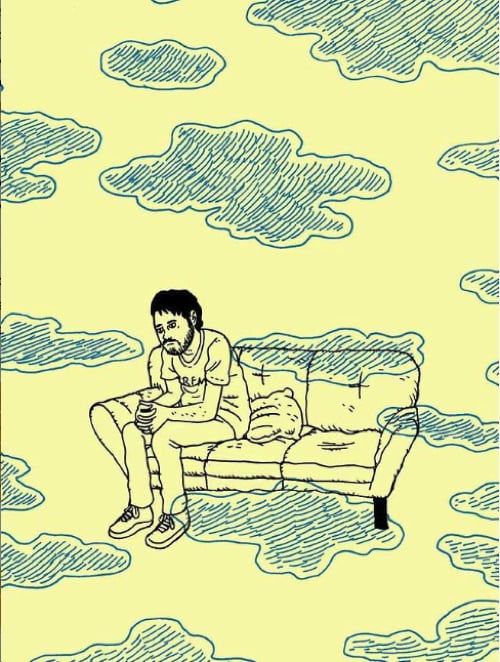
The first of the loot is Noah Van Sciver’s new minicomic, The Lizard Laughed. Beginning with a quote from Martin Sheen’s 2012 shared memoir with son Emilio Estevez, Along the Way, Sciver sets up this father-and-son narrative, contorted through his trademark doom-and-gloom thematic craftship. While the recognizable tropes of bleakness and brooding malaise are definitely present, Sciver is able to input some very quiet and reflective moments within this short piece that make it surprisingly satisfying.
Harvey is the deadbeat, stoner dad who gets an unexpected visit from the son he abandoned so many years ago. Although supposedly complacent with his role as an absent father, Harvey endeavors to enact what he believes is fatherly action to Nathan, offering affection through engaging in conversation and artistic similarity, and even planning a joint rendezvous, the time-honored tradition of a father-and-son hike. Harvey’s tragic, cumbersome attempt to fill in a paternal guise is apparent at every moment of the two’s interaction, and the emotional machismo on display is unwieldy.
The ending is no surprise, and there’s a sense of crushing disappointment for both father and son. While Harvey is sure to continue in his cyclical inability to truly connect with another person, Nathan walks away from revenge, and in a way comes to grips with understanding, even in disconnect, why Harvey is the way he is. It would be flawed to associate this comic as another father-and-son narrative, the cringe-worthy air between Harvey and Nathan actually sheds light on Sciver’s creative ability to ride that line between empathy and ridicule. There’s not a lot of people, let alone cartoonists, who can exhibit the gnarled grace that Sciver does with a character like Harvey, someone who is incredulously unlikeable and irrationally mulish to boot.
Sciver pacifies the overarching tension with Harvey’s meandering tales of playful, fantastical adventures with dangerous historic sites and imaginative recounts of mystical creatures. It’s in these stories that Harvey seems the most in touch with life, his childish sensibility drawn with a touch of humor. He is swallowed by the fantasy of his surroundings, and it’s never more clear how misguided and detached from reality he genuinely is, a palpable actuality that Nathan plainly sees.
I’m unsure if Sciver meant to comment on or parody the Sheen memoir Along the Way (something tells me neither Sheen nor Estevez wouldn’t be able to connect that sad, self-deprecating psyche in quite the same way), and The Lizard Laugh is anything but a Hollywood memoir. Sciver succeeds yet again in creating a narrative that turns the focus inward; to our own shortcomings that we reject by fluffing up our own perception of wisdom, and the choice Nathan makes that allows Harvey to retain some dignity, to not be small and nothing.
Crash Trash, an uber little comic from French cartoonist Olive Booger, is a streamlined reworking of his style’s drippy, color-saturated, hysteric scratchiness as seen in Kuš! And his graphic novel, I Like Short Songs. While superficially shrunken down to a 4” by 2.25” mini-mini–comic, Crash Trash packs a whole lot of trippy detail in the comic’s anthropologic recounting of the rise and fall of a fictional 1980s gang called the Trash Boys, along with the antics and lawlessness of their home base, the district of Crashtown.
It’s at first a little jarring to see such a small comic flushed with a heavy hand of text—almost every panel is scrawled with as much space filled with script as it is image. There is no dialogue, only narration and a smattering of effects, thereby pacing the comic quite cinematically, as panel transitions move from pull back shots of the Trash Boys to close-ups of a fallen comb or cross-cutting to a colossal punt by enemy gang, the Mega Dogs. At first glance, it may seem Olive was restricted by size in the type of details he could use to fill in details, yet his histrionic prose amplifies the limited visual space, resisting an urge to rapidly read the comic. There’s a rhythmic cleverness in the way the comic moves, an ebbing and tiding in the momentum as well as in the elevation of dramatic moments. The story is neither bounded with innovation, so when particular key words are bolded, it aids in setting the scene because you’re most likely able to attribute certain visual cues.
What I’ve said so far shouldn’t discount Oliver’s artistic aspiration; his style is still largely tangible even when stripped down to its red and black risographed print. His previous work harkens a definite Charles Burns influence with the thick, oil paint execution and thematics resonating with the sordid darkness of a city’s underbelly. Crash Trash is situated with the aesthetics of raw, punk desperation of his preceding I Like Short Songs but the simplicity in his line work has taken a new mode, less garish and more nuanced. It’s very impressive to see his art pulsate even with the oppressively tight margins of space.
A lot has been said about Melissa Mendes’s Lou, the seventeen issue long pillar amongst the Oily lineup. This newest addition, titled A Very Special Lou, marks a revisiting to the series which ended in August 2013, and a warm return it proves to be. Like a childhood friend or long unseen family member, A Very Special Lou is an entirely new narrative that retains its delightful, underlying spirit of kindred nostalgia.
One of the reasons I really took to this particular issue was how it gently touched on the omnipresence of fandom for professional wrestling. I’ve always been comfortable broadcasting myself as a fan of comics, and more recently I’ve come clean as a fan of professional wrestling. Fans of comics and professional wrestling share a long, complex history of facing ridicule for following such a denigrated form of entertainment—wrestlers and superheroes are arguably a form of con-job, deemed “fake” by those who choose to stand by higher media forms, be it athletics or literary elitists. However, criticisms aside, fans of wrestling and comics share a distinctly unique concept of play, where we consume media in a way that extends the narrative fluidly, defying rigid roles between the identities of producers and consumers.
A Very Special Lou functions both as a piece about being an admirer of comics as well as wrestling through the domestic lens of childhood imagination. Referencing wrestlers like King Kong Bundy and Hulk Hogan through 6-year-old John’s fannish fascination and how it’s lived through his family, Mendes yet again accesses the real emotions that we feel as charismatic kids and continue to feel today. Through the entire Lou serialization, Mendes almost effortlessly lets the reader dip into points of their own life, spurring even the most dormant, forgotten affections.
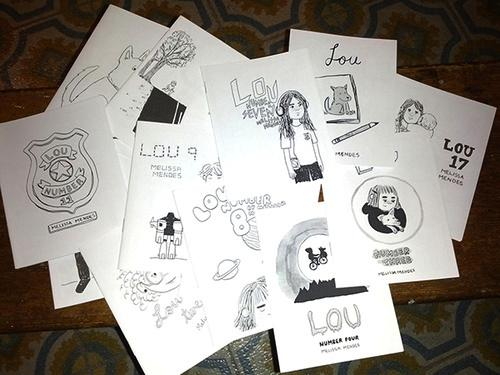
Stay up to date with all the Oily greatness by browsing the Oily Comics website.
(Image Credits: http://melissammmendes.tumblr.com, http://snakeoily.tumblr.com)


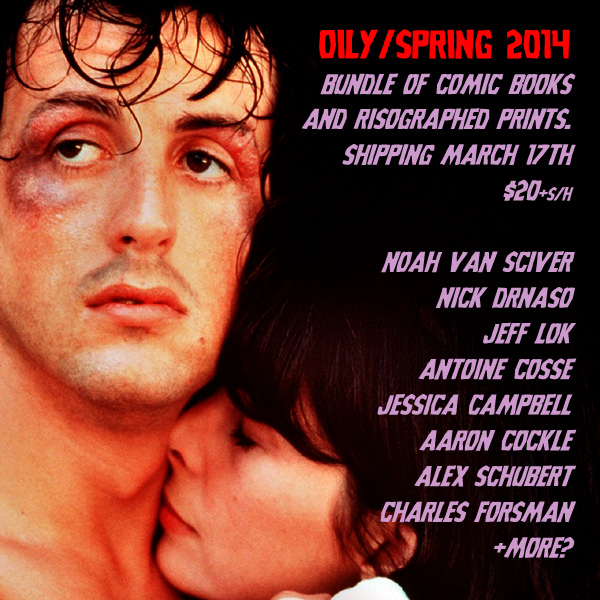
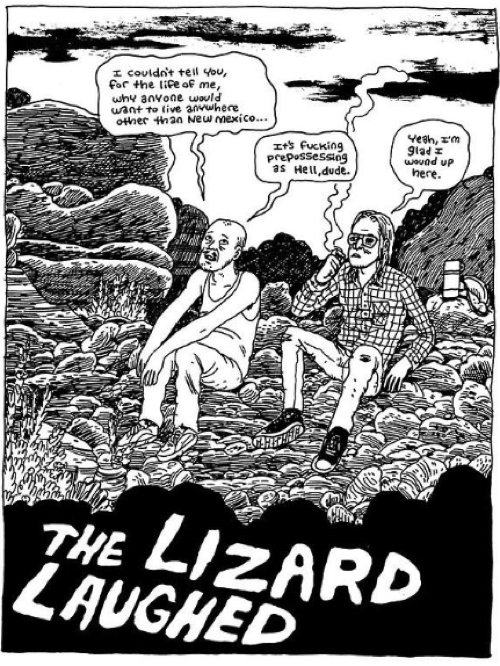
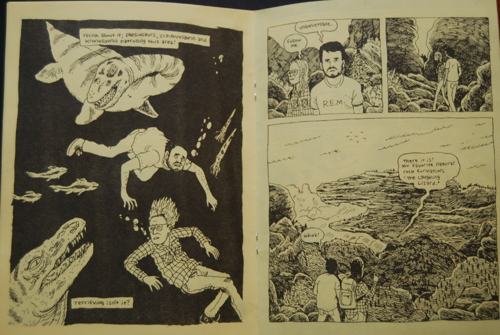
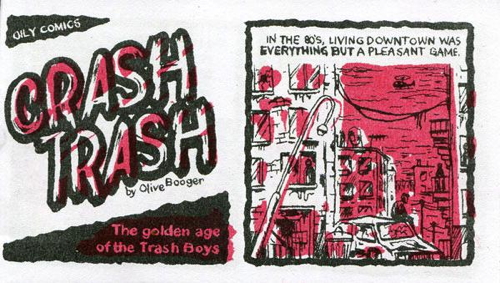

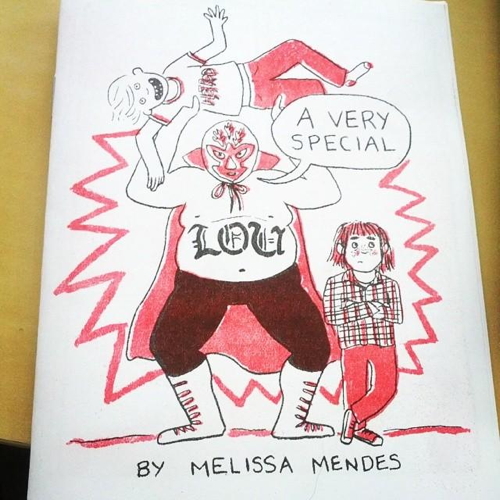
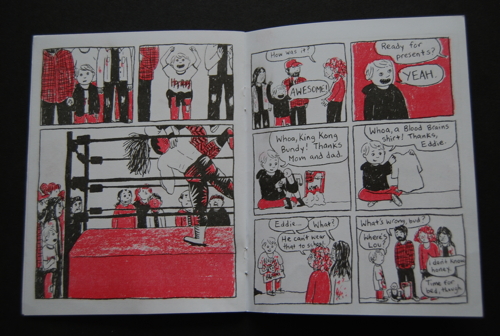


Comments are closed.